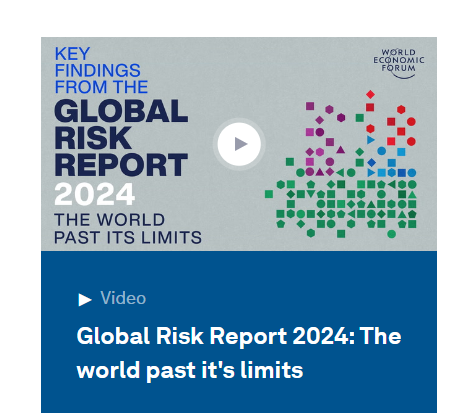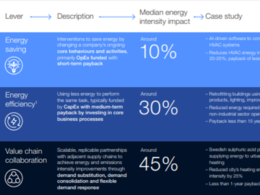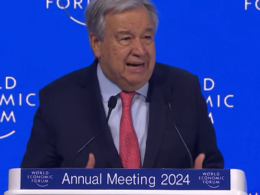The health strategist
research institute, knowledge portal & advisory consulting
for continuous health transformation
and digital health — for all
Joaquim Cardoso MSc.
Servant Leader,
Chief Research & Strategy Officer (CRSO),
Editor in Chief and Senior Advisor
January 16, 2024

Davos 2024: Who’s coming and what to expect — “Building Trust”
- The 2024 Annual Meeting of the World Economic Forum takes place from 15–19 January in Davos, Switzerland.
- The meeting convenes under the theme Rebuilding Trust, accessible to the wider public with over 200 sessions livestreamed — the full programme is available here.
- The meeting welcomes over 100 governments, all major international organizations and the Forum’s 1000 partner companies as well as civil society leaders, foremost experts, young changemakers, social entrepreneurs and the media.
Last year at Davos, the word ‘polycrisis’ was on everybody’s lips as leaders deliberated the cascading and connected crises of the moment.
Today, even as we turn our attention to new crises, the old ones persist.
“At a time when global challenges require urgent solutions, innovative public-private collaboration is necessary to convert ideas into action,” said Børge Brende, President, World Economic Forum.
“The Forum provides the structure for developing research, alliances and frameworks that promote mission-driven cooperation throughout the year. Next week’s Annual Meeting will serve as an accelerator of that cooperation, deepening connections between leaders and between initiatives.”
So, the question for leaders at Davos 2024: Will the coming year be a period of ‘permacrisis’? Or will 2024 be a time for resolution, resilience and recovery?
Who’s coming?
More than 300 public figures will participate this year, including more than 60 heads of state and government. There will be strong representation from all key regions of the world. Top political leaders taking part include:
Li Qiang, Premier of the People’s Republic of China; Emmanuel Macron, President of France; Ursula von der Leyen, President of the European Commission; Javier Milei, President of Argentina; Han Duck-soo, Prime Minister of the Republic of Korea; Pedro Sánchez, Prime Minister of Spain; Viola Amherd, President of the Swiss Confederation 2024 and Federal Councillor of Defence, Civil Protection and Sports; Volodymyr Zelenskyy, President of Ukraine; Alexander De Croo, Prime Minister of Belgium; Gustavo Francisco Petro Urrego, President of Colombia; Kyriakos Mitsotakis, Prime Minister of Greece; Mohammed Shyaa Al Sudani, Prime Minister of Iraq; Leo Varadkar, Taoiseach of Ireland; Bisher Hani Al Khasawneh, Prime Minister of the Hashemite Kingdom of Jordan; William Samoei Ruto, President of Kenya; Najib Mikati, President of the Council of Ministers of Lebanon; Oyun-Erdene Luvsannamsrai, Prime Minister of Mongolia; Mark Rutte, Prime Minister of the Netherlands; Bola Ahmed Tinubu, President of Nigeria; Andrzej Duda, President of Poland; Mohammed Bin Abdulrahman Al Thani, Prime Minister and Minister of Foreign Affairs of the State of Qatar; Aleksandar Vučić, President of Serbia; Tharman Shanmugaratnam, President of Singapore; Ranil Wickremesinghe, President of Sri Lanka; Isaac Herzog, President of the State of Israel; Srettha Thavisin, Prime Minister of Thailand; Pham Minh Chinh, Prime Minister of Viet Nam.
As well as:
Antony Blinken, US Secretary of State; Jake Sullivan, US National Security Adviser, and representatives from the Senate and House of Representatives.
Heads of international organizations taking part include:
António Guterres, UN Secretary-General; Kristalina Georgieva, Managing Director, International Monetary Fund; Ajay S. Banga, President, World Bank Group, Ngozi Okonjo-Iweala, Director-General, World Trade Organization; Jens Stoltenberg, Secretary-General, North Atlantic Treaty Organization; Tedros Adhanom Ghebreyesus, Director-General, World Health Organization; Achim Steiner, Administrator, United Nations Development Programme.
An estimated 1,600 business leaders, including 800-plus of the world’s top CEOs and chairs from the World Economic Forum’s Members and Partners, will participate. There will also be more than 150 Global Innovators, Tech Pioneers and Unicorns who are transforming industries.
More than 200 members of the Forum’s Global Shapers, Young Global Leaders and Social Entrepreneurs communities will join to showcase local innovations and solutions. Also taking part in the meeting will be more than 150 experts and heads of the world’s leading universities, research institutions and think tanks. More than 40 labour, nongovernment organization and religious leaders from civil society will take part as well.
Heads of civil society organizations include: Kirsten Schuijt, Director-General, WWF International; David Miliband, President, International Rescue Committee; Luc Triangle, General Secretary, International Trade Union Confederation; Tirana Hassan, Executive Director, Human Rights Watch.
The Annual Meeting 2024 will continue to be informative and accessible to the wider public through the livestreaming of over 200 sessions. In addition, the Open Forum, now in its 21st year, will host panel discussions open to the public under the theme “From Life to Lab: Science in Action”. The Global Collaboration Village will continue to advance its work at the meeting and broaden public access.
Rebuilding Trust
Davos 2024 is the 54th Annual Meeting of the World Economic Forum. Under the theme Rebuilding Trust, the meeting aims to restore collective agency, and reinforce the fundamental principles of transparency, consistency and accountability among leaders.
The programme embodies a “back to basics” spirit of open and constructive dialogue between leaders of government, business and civil society. The goal is to help connect the dots in an increasingly complex environment and provide foresight by introducing the latest advances in science, industry and society.
Throughout the week, sessions will feature the latest proposals for progress on global security, trade, economic growth, jobs, climate and nature action, the energy transition, technological disruption, and health and well-being. The full programme is available here.
The meeting is organized around four areas:
- 1.Achieving Security and Cooperation in a Fractured World
- 2.Creating Growth and Jobs for a New Era
- 3.Artificial Intelligence as a Driving Force for the Economy and Society
- 4.A Long-Term Strategy for Climate, Nature and Energy
1.Achieving Security and Cooperation in a Fractured World
How can we effectively deal with security crises, such as the current situation in the Middle East, while at the same time putting the floor under the structural forces of fragmentation? How can we identify areas where cooperation is essential to ensure a win-win scenario for all stakeholders?
Building on the Forum’s long-term and structured engagement with governments, international organizations and experts from all regions. See more here.
2.Creating Growth and Jobs for a New Era
How can government, business and civil society come together around a new economic framework to avoid a decade of low growth and put people at the centre of a more prosperous trajectory? How can we minimize trade-offs and maximize synergies in a situation where traditional measures seemingly fail?
Supported through partnerships with international economic institutions and top academics, as well as the Forum’s work on competitiveness, innovation and human capital. See more here.
3.Artificial Intelligence as a Driving Force for the Economy and Society
How can we use AI to benefit all? How is the divergent regulatory landscape balancing innovation with societal risks? How will AI interface with other transformative technologies, including 5/6 G, quantum computing and biotechnology?
Anchored in the Forum’s AI Governance Alliance, integrating key governments and companies, and in 20 Centres for the Fourth Industrial Revolution worldwide. See more here.
4.A Long-Term Strategy for Climate, Nature and Energy
How can we develop a long-term systemic approach to achieve the objectives of a carbon-neutral and nature-positive world by 2050 while providing affordable, secure and inclusive access to energy, food and water? How do we balance these trade-offs to achieve social consensus?
Integrating the work of multiple purpose-driven Forum initiatives, including the CEO Climate Leaders and the First Movers Coalition. See more here.
Follow the meeting here. To learn more about the Forum’s impact, see here. And to read insights and see the latest publications from the Forum, go here.
Davos Agenda
Davos 2024: Rebuilding Trust — could this be a year for resolution and recovery? Image: World Economic Forum
Lead Editor, World Economic Forum
Stay up to date:
Davos Agenda
Follow
The Agenda Weekly
A weekly update of the most important issues driving the global agenda
Originally published at https://www.weforum.org on December 11, 2023.












